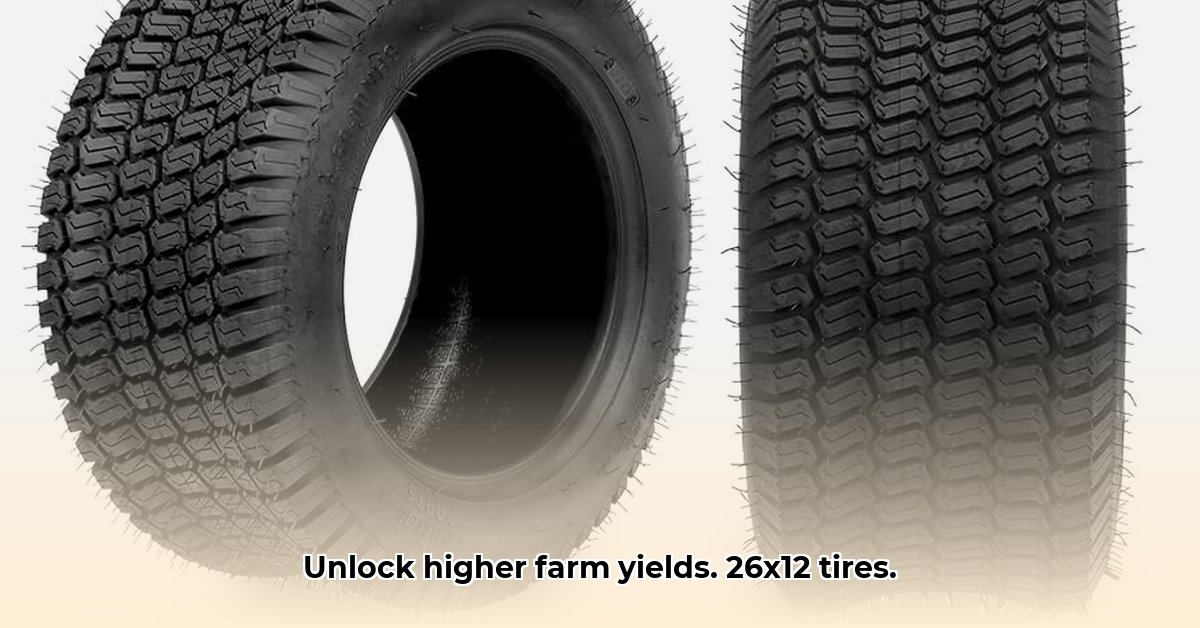
26x12 Tractor Tires: Boosting Your Farm's Sustainability and Bottom Line
26x12 tractor tires are more than just rubber; they're integral to efficient and sustainable farming practices. Their dimensions (26 inches diameter, 12 inches wide) offer versatility across various operations. Selecting the right tires significantly impacts productivity and long-term farm viability. For more tire size options, see our guide on other tractor tire sizes.
Understanding the Role of 26x12 Tractor Tires in Sustainable Farming
Sustainable agriculture isn't just a trend; it's a financially sound strategy. 26x12 tires are key players in making this happen. Soil compaction, a major concern impacting water retention and root growth, is significantly reduced by these larger tires due to better weight distribution. This translates to healthier soil, leading to stronger plants and, ultimately, higher yields.
Reduced compaction often allows for less frequent tillage. Tilling is energy-intensive and can disrupt soil structure, increasing erosion. Minimizing tillage saves fuel and labor costs while preserving topsoil. Improved traction, particularly in wet conditions, further reduces the number of passes needed, minimizing fuel consumption and greenhouse gas emissions. This is a direct route to saving money while acting as stewards of the environment. Isn't that a win-win scenario?
Selecting the Right Tires: Matching Your Needs to the Land
Choosing the right 26x12 tires requires considering several factors:
Soil Type: Heavy clay soils need tires with aggressive tread patterns (deep lugs) for better grip and to minimize compaction. Lighter, sandier soils may need tires focused on minimizing compaction while maintaining sufficient traction.
Climate: Wet climates require tires with excellent drainage to prevent mud buildup and maintain traction. Dry climates might prioritize minimizing compaction or maximizing fuel efficiency.
Farming Practices: No-till farming, a cornerstone of sustainable agriculture, needs tires designed to minimize soil disturbance. This helps preserve soil structure and encourage natural fertility cycles.
Crop Type: Some crops are more susceptible to soil compaction than others. Consider your crops' sensitivity when selecting tires.
Here's a simplified guide:
| Soil Type | Climate | Farming Practice | Ideal Tire Characteristics |
|---|---|---|---|
| Heavy Clay | Wet | Conventional | Deep lugs, excellent drainage |
| Sandy | Dry | No-till | Reduced compaction, good traction |
| Light Clay | Moderate | Conventional | Moderate lugs, balancing grip and compaction reduction |
| Loam | Varies | No-till/Conventional | Versatile design, prioritizing soil health |
Maintenance: Keeping Your Tires in Top Shape
Proper tire maintenance is crucial for efficiency and longevity. This enhances your return on investment.
Regular Inflation Checks: Underinflation increases wear and tear, while overinflation damages the soil. Maintain the manufacturer's recommended pressure; accurate tire pressure is crucial for efficient operation.
Tire Rotation: Rotate tires regularly for even wear, prolonging lifespan and performance consistency.
Avoid Hard Surfaces: Driving on hard surfaces accelerates wear. Keep to the fields whenever possible.
Regular Inspections: Regularly inspect for cuts, punctures, or damage. Addressing minor issues promptly prevents major problems later.
The Long-Term Cost Benefits: Investing in Efficiency and Sustainability
While initial costs might seem high, high-quality 26x12 tires offer significant long-term savings.
- Extended Lifespan: Fewer replacements mean lower lifetime costs.
- Improved Fuel Efficiency: Reduced compaction and better traction translate to fuel savings.
- Increased Yields: Healthier soil leads to improved crop production, boosting profits.
- Reduced Need for Inputs: Less compaction might mean lower fertilizer and pesticide needs, further reducing costs. This contributes to a more sustainable farming approach.
Case Studies: Real-World Success Stories
Many farms have seen positive results. One organic farm reported a 10% increase in fuel efficiency and a 5% yield increase after switching to tires better suited for their soil and operations. These are tangible examples of the potential benefits.
26x12 Tractor Tires: A Smart Investment for a Sustainable Future
26x12 tractor tires are a smart investment for a sustainable and profitable farming future. Choosing the right tires and practicing regular maintenance will significantly reduce costs, improve efficiency, enhance soil health, and contribute to a more environmentally responsible farming operation. It's about working smarter, not harder, and maximizing your return on investment.